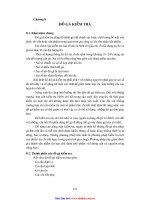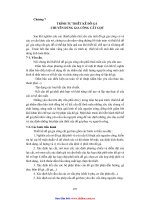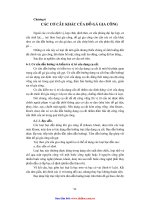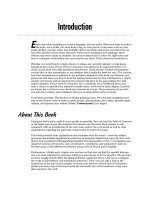Giáo trình động từ tiếng Pháp - Part I Living in the Here and Now: The Present Indicative - Chapter 6 potx
Bạn đang xem bản rút gọn của tài liệu. Xem và tải ngay bản đầy đủ của tài liệu tại đây (227.7 KB, 8 trang )
Chapter 6
Forming the Present Participle
and the Gerund
In This Chapter
ᮣ Explaining the present participle
ᮣ Practicing gerunds
ᮣ Figuring out the past present participle
H
ow do you do your daily chores? Do you work or drive to work while singing, talking,
listening to the radio, or keeping quiet? Well, you can describe how you do things as
well as why and under which circumstances with the present participle and the gerund.
In this chapter I cover the present participle, show you how to form a gerund, and then
show you how to use them.
Introducing the Present Participle
The present participle is used to express the way things are done, as well as why and how
they’re done. It expresses manner, cause, and circumstances. The present participle
answers the questions “why” and “how.” In English, it always ends in
-ing — examples
include
singing, walking, and so on. In French, the present participle ends in -ant — examples
include
chantant and marchant. Forming the present participle is easy for regular verbs and
for most irregular verbs. Simply take the first person plural (the
nous form) of any present
tense verb, drop the
-ons ending, and add -ant.
(Nous) allons (We go/are going) becomes allant (going) when you drop the -ons and add
-ant to the verb.
The subject pronoun
nous isn’t part of the present participle. Table 6-1 forms the present
participle for some regular and irregular verbs.
Table 6-1 Forming the Present Participle
Infinitive Nous Form Present Participle
aller allons allant (
going
)
appeler appelons appelant (
calling
)
commencer commençons commençant (
beginning
)
(continued)
10_773883 ch06.qxp 8/2/06 1:27 PM Page 69
Table 6-1
(continued)
Infinitive Nous Form Present Participle
faire faisons faisant (
doing
)
finir finissons finissant (
finishing
)
manger mangeons mangeant (
eating
)
parler parlons parlant (
speaking
)
partir partons partant (
leaving
)
préférer préférons préférant (
preferring
)
prendre prenons prenant (
taking
)
vendre vendons vendant (
selling
)
venir venons venant (
coming
)
voir voyons voyant (
seeing
)
Only three verbs have an irregular present participle. They are
ߜ avoir (to have), which becomes ayant (having)
ߜ être (to be), which becomes étant (being)
ߜ savoir (to know), which becomes sachant (knowing)
Using the Present Participle
The present participle has many functions. In fact, you can use the present participle
in the following three ways:
ߜ To indicate cause or circumstances. When you use the present participle to indi-
cate cause or circumstances, it’s always in the same form and doesn’t have to
agree with anything (such as a pronoun). For example, Comprenant le français,
j’ai regardé le film en version originale
means Understanding French, I watched
the film in its original version.
Ayant de l’argent, elle a pu voyager means Having
some money, she was able to travel.
ߜ As an adjective. When you use the present participle as an adjective, it agrees in
gender and number with the noun it modifies. For example,
C’est une histoire
intéressante
means It is an interesting story.
ߜ As a noun. Some nouns in French are derived from the present participle. For
example,
L’assistante du cadre est très efficace means The manager’s assistant is
very efficient.
Du café Dôme, on regarde les passants means From the café
Dôme, we watch the passersby.
Now it’s your turn. Put the following verbs in the present participle. I provide the
translations in the Answer Key.
Q. Rire _________________
A. Riant (laughing)
70
Part I: Living in the Here and Now: The Present Indicative
10_773883 ch06.qxp 8/2/06 1:27 PM Page 70
1. Boire _________________
2. Mettre _________________
3. Savoir _________________
4. Tenir _________________
5. Ecrire _________________
6. Vouloir _________________
7. Craindre _________________
8. Faire _________________
9. Avoir _________________
10. Nager _________________
Forming the Gerund
A gerund is a verb-noun. It looks like a verb, but actually works as a noun. For exam-
ple, in the sentence
walking to the store is fun, walking looks like a verb, but it’s in fact
a noun. In this phrase,
walking is a gerund.
In French, to form the gerund, just add the preposition
en in front of the present par-
ticiple. The gerund in English translates to
while, by, upon, or in doing something.
Remember that the gerund often indicates a simultaneous action.
La fille chante en marchant. (The girl is singing while walking.)
Les étudiants écoutent de la musique en faisant leurs devoirs. (The students
listen to music while doing their homework.
)
In this section I show you how to form the gerund as well as how you use it in French.
I then provide you with some practice problems to ensure that you understand gerunds.
Using the gerund
In addition to indicating a simultaneous action, you can use the gerund to express
manner or circumstances.
En entrant dans le bâtiment, j’ai vu Paul. (Upon/In entering the building, I saw
Paul.
)
J’ai compris la situation politique en lisant les journaux. (I understood the politi-
cal situation upon/in/by reading the newspapers.
)
You can add
tout in front of the gerund in order to make the simultaneous actions
stronger, generally to stress a contradiction. For example, Elle lit le journal
tout en
regardant
la télévision means She is reading the newspaper while watching television.
The gerund is also used in many famous proverbs in French. For example, C’est en
forgeant que l’on devient forgeron
means It is by blacksmithing that one becomes a
blacksmith.
Or as you say in English, practice makes perfect.
71
Chapter 6: Forming the Present Participle and the Gerund
10_773883 ch06.qxp 8/2/06 1:27 PM Page 71
Now take the time to make your own proverbs by putting the verbs in parentheses in
the gerund form. I provide the translations in the Answer Key.
Q. C’est _________________ (faire) la cuisine que l’on devient cuisinier.
A. C’est en faisant la cuisine que l’on devient cuisinier. (It’s by cooking that one becomes a
cook.
)
11. C’est _________________ (nager) que l’on devient nageur.
12. C’est _________________ (jardiner) que l’on devient jardinier.
13. C’est _________________ (peindre) que l’on devient peintre.
14. C’est _________________ (écrire) que l’on devient écrivain.
15. C’est _________________ (chanter) que l’on devient chanteur.
16. C’est _________________ (danser) que l’on devient danseur.
17. C’est _________________ (sculpter) que l’on devient sculpteur.
18. C’est _________________ (composer) que l’on devient compositeur.
19. C’est _________________ (juger) que l’on devient juge.
20. C’est _________________ (parler) beaucoup de langues que l’on devient interprète.
Pronominal verbs: Corresponding to the subject
With pronominal verbs, the pronominal pronoun corresponds to the subject. See
Chapter 5 for more information on reflexive verbs.
En nous promenant, nous avons trouvé dix euros. (While strolling/taking a walk,
we found ten euros.
)
Jean s’est coupé en se rasant. (Jean cut himself while shaving.)
J’étais toujours fatiqué en me réveillant. (I was still tired in waking up.)
One general difference between the present participle and the gerund is that the pres-
ent participle is linked to the noun, whereas the gerund is linked to the verb. For
example,
J’ai vu Olivier sortant du café means I saw Olivier leaving the café. The
present participle is associated with Olivier, who is the noun. (Olivier was leaving the
café.) Whereas in the sentence J’ai vu Olivier en sortant du café (I saw Olivier while
[I was] leaving the café
), the use of the gerund, which is linked to the verb, says that I
saw Olivier while I was leaving the café.
In the following exercises, choose between the present participle and the gerund and
fill in the blanks. I provide the translations in the Answer Key.
Q. La petite fille chante _________________ (jouer) du piano.
A. La petite fille chante en jouant du piano. (The little girl is singing while playing the piano.)
21. C’est une idée _________________ (encourager).
72
Part I: Living in the Here and Now: The Present Indicative
10_773883 ch06.qxp 8/2/06 1:27 PM Page 72
22. Il parle à sa femme _________________ (conduire).
23. Vous demandez pardon _________________ (savoir) que vous avez tort.
24. On maigrit _________________ (manger) moins.
25. Elle fait des gestes _________________ (raconter) des histoires.
26. Je me sens mieux _________________ (faire) de l’exercice.
27. Les enfants _________________ (sourire) ouvrent leurs cadeaux.
28. Le bébé se calme _________________ (entendre) la voix de sa mère.
29. _________________ (vouloir) apprendre l’italien, nous allons en Italie.
30. Ce sont des chiens _________________ (obéir).
Forming and Using the
Past Present Participle
The present participle also has a past form. To create this form, you need an auxiliary
verb
(avoir or être), which is a verb that’s used to help form all the compound past
tenses of verbs. In English, this form is called the perfect participle and is indicated
by adding a past participle to the present participle of the auxiliary, as in the phrases
having eaten, having left, and so on. In French, simply put the auxiliaries avoir and être
in the present participle (ayant and étant) and add the past participle of the verb you
want — for example,
ayant mangé (having eaten) and étant parti (having left). (Check
out Chapter 12 for more on the passé composé if you need help with the translations.)
How do you use this past form of the present participle? Use it when its action comes
before the action of the main verb.
Ayant lu l’article, il a découvert la vérité. (Having read the article, he discovered the
truth.
)
Étant arrivé en retard, il a manqué le début du film. (Having arrived late, he
missed the beginning of the movie.
)
Now try something challenging. Transform these sentences by changing the auxil-
iaries
avoir and être into the present participle form and getting rid of the subject
pronoun and the conjunction, like in the example. Then translate the sentences. I give
you the past participles to help you get started.
Q. J’ai écouté la musique classique et je me suis calmé. (I listened to classical music and I
calmed down.
)
A. Ayant écouté la musique classique, je me suis calmé.
Having listened to classical music, I calmed down.
31. Il avait trop mangé et il s’est endormi dans le sofa. (He had eaten too much and he fell
asleep on the sofa.
)
__________________________________________________________________________________
__________________________________________________________________________________
73
Chapter 6: Forming the Present Participle and the Gerund
10_773883 ch06.qxp 8/2/06 1:27 PM Page 73
32. Nous étions en retard et nous avons couru. (We were late and we ran.)
__________________________________________________________________________________
__________________________________________________________________________________
33.
Ils avaient raté le train et ils sont rentrés en retard. (They had missed the train and they
came home late.
)
__________________________________________________________________________________
__________________________________________________________________________________
34.
Elle avait réussi à l’examen et elle était très heureuse. (She had passed the exam and she
was very happy.
)
__________________________________________________________________________________
__________________________________________________________________________________
35.
Tu étais rentré tard et tu es monté tout de suite dans ta chambre. (You had come home
late and you went to your room right away.
)
__________________________________________________________________________________
__________________________________________________________________________________
36.
J’étais resté dans la maison tout le weekend et je me suis ennuyé. (I had stayed home all
weekend and I was bored.
)
__________________________________________________________________________________
__________________________________________________________________________________
37.
Vous aviez pris une douche et vous vous êtes habillé. (You had taken a shower and you
got dressed.
)
__________________________________________________________________________________
__________________________________________________________________________________
38.
Il avait suivi un régime et il a maigri. (He had gone on a diet and he lost weight.)
__________________________________________________________________________________
__________________________________________________________________________________
39.
J’étais tombé de l’escalier et je me suis cassé la jambe. (I had fallen from the staircase
and I broke my leg.
)
__________________________________________________________________________________
__________________________________________________________________________________
40.
Ils avaient fait leurs devoirs et ils sont sortis. (They had done their homework and they
went out.
)
__________________________________________________________________________________
__________________________________________________________________________________
74
Part I: Living in the Here and Now: The Present Indicative
10_773883 ch06.qxp 8/2/06 1:27 PM Page 74
Answer Key
In this section I give you the answers to all the problems in this chapter. I also provide
translations to help you know what you’ve just conjugated. How did you do?
a
buvant (drinking)
b
mettant (putting)
c
sachant (knowing)
d
tenant (holding)
e
écrivant (writing)
f
voulant (wanting)
g
craignant (fearing)
h
faisant (doing)
i
ayant (having)
j
nageant (swimming)
k
C’est en nageant que l’on devient nageur. (It’s by swimming that one becomes a swimmer.)
l
C’est en jardinant que l’on devient jardinier. (It’s by gardening that one becomes a gardener.)
m
C’est en peignant que l’on devient peintre. (It’s by painting that one becomes a painter.)
n
C’est en écrivant que l’on devient écrivain. (It’s by writing that one becomes a writer.)
o
C’est en chantant que l’on devient chanteur. (It’s by singing that one becomes a singer.)
p
C’est en dansant que l’on devient danseur. (It’s by dancing that one becomes a dancer.)
q
C’est en sculptant que l’on devient sculpteur. (It’s by sculpting that one becomes a sculptor.)
r
C’est en composant que l’on devient compositeur. (It’s by composing that one becomes a
composer.
)
s
C’est en jugeant que l’on devient juge. (It’s by judging that one becomes a judge.)
t
C’est en parlant beaucoup de langues que l’on devient interprète. (It’s by speaking many
languages that one becomes an interpreter.
)
u
C’est une idée encourageante. (It’s an encouraging idea.)
v
Il parle à sa femme en conduisant. (He speaks to his wife while driving.)
w
Vous demandez pardon sachant que vous avez tort. (You ask for forgiveness knowing that you
are wrong.
)
x
On maigrit en mangeant moins. (One loses weight by eating less.)
75
Chapter 6: Forming the Present Participle and the Gerund
10_773883 ch06.qxp 8/2/06 1:27 PM Page 75
y
Elle fait des gestes en racontant des histoires. (She makes gestures while telling stories.)
A
Je me sens mieux en faisant de l’exercice. (I feel better by exercising.)
B
Les enfants souriants ouvrent leurs cadeaux. (The smiling children open their presents.)
C
Le bébé se calme en entendant la voix de sa mère. (The baby calms himself by hearing his
mother’s voice.
)
D
Voulant apprendre l’italien, nous allons en Italie. (Wanting to learn Italian, we are going to Italy.)
E
Ce sont des chiens obéissants. (They are obedient dogs.)
F
Ayant trop mangé, il s’est endormi dans le sofa.
Having eaten too much, he fell asleep on the sofa.
G
Ayant été en retard, nous avons couru.
Having been late, we ran.
H
Ayant raté le train, ils sont rentrés en retard.
Having missed the train, they came home late.
I
Ayant réussi à l’examen, elle était très heureuse.
Having passed the exam, she was very happy.
J
Etant rentré tard, tu es monté tout de suite dans ta chambre.
Having come home late, you went to your room right away.
K
Etant resté dans la maison tout le weekend, je me suis ennuyé.
Having stayed home all weekend, I was bored.
L
Ayant pris une douche, vous vous êtes habillé.
Having taken a shower, you got dressed.
M
Ayant suivi un régime, il a maigri.
Having gone on a diet, he lost weight.
N
Etant tombé de l’escalier, je me suis cassé la jambe.
Having fallen from the staircase, I broke my leg.
O
Ayant fait leurs devoirs, ils sont sortis.
Having done their homework, they went out.
76
Part I: Living in the Here and Now: The Present Indicative
10_773883 ch06.qxp 8/2/06 1:27 PM Page 76









